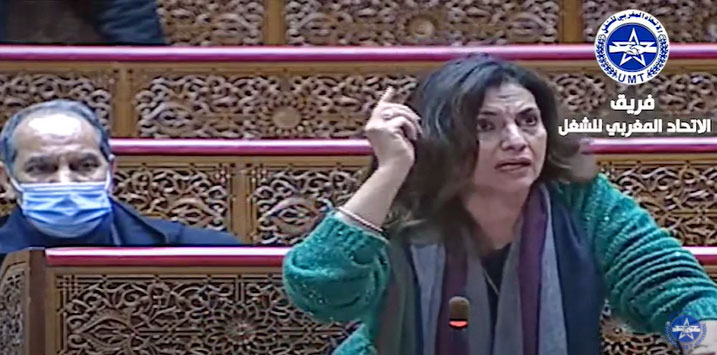
Feb 11, 2021
A 14-year old girl was among the 28 garment workers killed in a factory disaster in Tangier, Morocco, this week. Her mother says she had worked at the factory, an illegal sweatshop, for three years.
The workers were drowned or electrocuted after a flood caused a short circuit. Seventeen others were injured. The facility operated in an underground garage in a residential area with 130 workers, most of them women. A nearby resident rescued some of the workers by throwing a rope into the flooded factory.
“How could this factory have been a secret? Where were the labor inspectors? Where were the local government authorities? Where were the investors?” asked Amal El Amri, a representative in Morocco’s upper house of Parliament and Moroccan Labor Union (UMT) member.
Residents in the area say the sweatshop operated for more than 20 years.
“We must ensure a voice for these workers who have died, and for the many thousands more women workers who toil under the same dangerous conditions,” El Amri said. In January, a fire at another illegal textile factory in Tangier injured one person and destroyed the factory, where 400 people worked.
The UMT and Democratic Labor Confederation (CDT), both Solidarity Center partners, demanded an immediate investigation into the tragedy, and the CDT said in a statement that it holds the state, the government and the employers fully responsible for the workers’ deaths.
Fast Fashion Industry Spawns Illegal Factories
Across from Spain on Morocco’s northern coast, Tangier is a key hub of Morocco’s textile manufacturing. Countrywide, official statistics show 1,200 textile companies with 165,000 workers—27 percent of the country’s industrial employment.
Yet many factories in Morocco’s textile and leather industry—estimates range in the thousands—operate illegally, forcing workers to labor long hours for low pay in often dangerous conditions. A 2012 investigation revealed that workers in illegal Moroccan textile sweatshops work, on average, 55 to 65 hours per week—11 to 21 hours more than the legal limit.
Operating outside national labor laws or standards, illegal factories are a direct response to the demands of the fast fashion industry, in which large brands demand quick response to fashion changes and customer demands and so draw on subcontractors whose workforce is cheaper and its work arrangements informal.
With no job stability and few social protections, garment workers in the informal economy are subject to exploitation and abuse, with no health coverage, pensions or other social and legal protections. Some one-third of Morocco workers are in the informal economy, which accounts for 14 percent of the country’s gross domestic product.
‘Companies Must Be Held Accountable’
As the global labor movement joins in calls for accountability in a supply chain where workers pay the price for cheap production, the Morocco Contribution Forum is urging the government to close all workplaces without health and safety protections and establish a policy to ensure severe penalties for companies operating outside the law.
Public officials must “improve the rights and living standard of marginalized people who are victims of oppression and violence, whether it is on the way to work, or in the workplace, and to provide them with the minimum conditions of human rights,” the Forum, a Solidarity Center partner, said in a statement.
Feb 8, 2021
In a boost for Ukraine’s anti-corruption efforts and worker rights, Olena Bebeshko, leader of the Independent Trade Union of Aviation Workers of Ukraine at the VIP terminal at Kyiv’s Boryspil International Airport, won a landmark legal victory last week. An appeals court affirmed a 2021 lower court decision that—under whistleblower-protection rules—Bebeshko had been illegally fired in retaliation for reporting widespread corruption at the terminal.
The court ordered immediate reinstatement, at full pay, and awarded her $5,300 compensation.
“This case is a milestone for labor rights protections and combating large scale corruption,” said Independent Aviation Workers Union of Ukraine President Veniamin Tymoshenko.
After reporting corruption at the terminal to Ukraine’s National Anticorruption Bureau, Bebeshko and other terminal workers suffered harassment and violent attacks. For example, a mother of two, Natalia Zhulinska, was fired after refusing to ignore improper activities and almost entirely blinded in a 2017 acid attack. Before that, her car was destroyed by fire, with explosives and weapons planted inside to frame her for the attempt on her life, says her union.
Bebeshko was fired in 2021 after directing corruption allegations from the union to the National Anticorruption Bureau. Although a lower court ordered that she be reinstated immediately, she was denied admittance to her workplace and her pay cut by one-third during the appeals process.
The court decision has advanced the country’s fight for whistleblower rights and against corruption. Bebeshko is of one of very few workers to have won official whistleblower status in Ukraine, despite new legislation that provides whistleblowers with added protections, especially as applied to labor rights.
Transparency International in 2020 ranked Ukraine 122 out of 181 countries in relative degree of corruption. The “Solidarity Against Corruption” campaign—a broad alliance of civil society members including unions and Solidarity Center partner Labor Initiatives (LI)—aims to improve legal protections for workplace rights, whistleblowers and freedom of association in Ukraine.
Workers at the Boryspil airport VIP terminal began reporting rampant corruption in 2014 after new management took over following a change of government. Loyalists willing to engage in, or facilitate, corruption allegedly retained their jobs while 50 workers were laid off and their positions turned over to new managers’ friends and family. The goal, the union says, was to ensure that only those willing to ignore or support management skimming of airport funds—among other corrupt practices—worked the terminal. Terminal workers the following year organized and affiliated to the Ukrainian Independent Trade Union of Aviation Workers of Ukraine to collectively protect their jobs, and the public, from corrupt practices at the terminal.
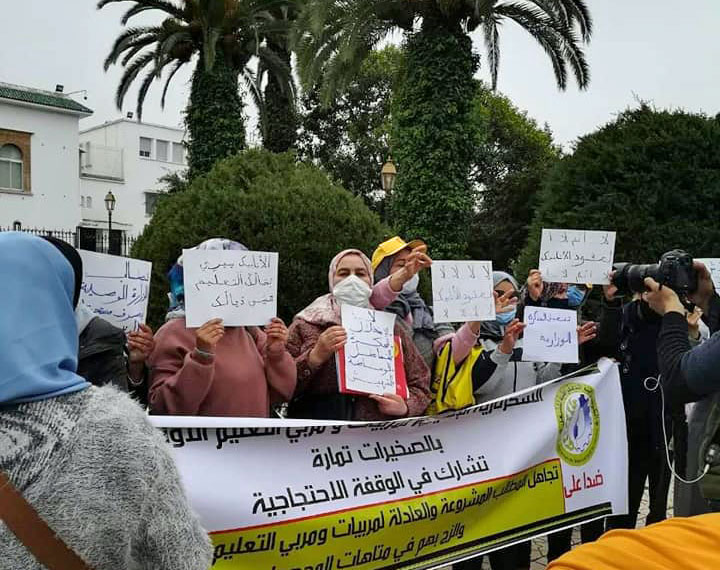
Feb 4, 2021
Teachers carried out protests throughout January against a government crackdown on their fundamental freedom to strike, with rallies at the Ministry of National Education and Vocational Training in the capital, Rabat, and across the country. Teachers also are protesting the working conditions of contractual teachers and the Ministry of Education’s refusal to engage in social dialogue.
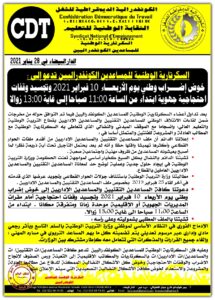
The CDT is calling for nationwide protests February 10 around education worker demands. Credit: CDT
Morocco’s constitution has protected the right to strike since 1962, but the government seeks to revise the country’s labor law by adding significant obstacles to the right to strike, in violation of Morocco’s international legal obligations. Unions are calling on the government to engage in real social dialogue to develop legislation consistent with international law.
“These abusive measures constitute a flagrant violation of the constitution, of the guarantee of the right to strike and of national laws, as well as against international conventions that consider the right to strike a fundamental part of freedom of association,” the Democratic Labor Confederation (CDT) wrote in a December letter to Educational International. The global federation, Education International, strongly supports the CDT and the National Union of Teachers (SNE) in their efforts to push back against the government’s moves to limit essential worker rights.
The government also barred a planned December 22 sit-in on at the Education Ministry headquarters in Rabat, citing exceptional circumstances and the law on health emergencies. Union members and leaders called the ban illegal and said security service used force to disperse them before they could reach the Ministry’s headquarters.
The January actions follow a series of rallies and sit-ins across Morocco last fall, including a national general strike on December 1 and 2, as teachers protested the government’s move to reduce their seniority and promotion opportunities and its replacement of full-time teachers with teachers on contract who are paid lower wages and have no job security.
Education Officials Refuse to Meet with Teachers
Morocco’s workers and their unions have been left out of discussions regarding management of the COVID-19 crisis and educational continuity, according to the SNE-CDT. The union says the ministry has not fully addressed health and safety conditions for teachers, education support staff and pupils.
Education ministry officials have frozen dialogue with teachers, last meeting with them in February 2019. One of the union’s fundamental demands is for the government “to open a serious and responsible dialogue on the outstanding demands from 2014 to today, and the respect of trade union freedoms and the right to strike.” Among the unresolved issues are improved wages, a voice for teachers in the education reform process, investment in public education, teacher training and more staffing to lower classroom size.
In early January, the CDT also spoke out against the ministry’s unilateral decision to cancel upcoming examinations for middle and high school students due to the pandemic, highlighting another example of how the education ministry fails to involve the representatives of teachers and other employees of the public school system in decision making.
More Teachers on Contract, with Few Rights
In early 2019, a government decree removed the option of workers with renewable two-year employment contracts to integrate into the public sector, a move that means contract teachers have no access to fair wages and social benefits like pensions, health care or job security. The CDT has sought to replace fixed-term contracts with permanent employment.
The number of fixed-term teaching contracts is increasing in Morocco and undermines the core notion of public service. The change grants the government a waiver on its obligations, according to a recent CDT field study on the future of work in the education sector, carried out in collaboration with the Solidarity Center. “Some of the direct results of casualization, as identified through the study, include instability, precariousness, dissatisfaction and lack of confidence in the profession’s future,” the CDT notes.
The study also finds an increasing number of women in all levels of the education system, and the future of work in the education sector must address this shift, says Younes Firachin, a member of the National Office of the National Education Union. That requires unions “to fully grasp these transformations” to effectively reach them and address their concerns, he says.
Employees throughout the public education system, frustrated by the lack of attention to their terms and conditions of employment, increasingly are joining the protests. On January 27, many who provide assistance to young children in kindergarten and primary school rallied in Rabat.
The CDT also announced a series of nationwide protests set for February 10 to mobilize administrative and technical assistants to call for their recognition by the Ministry of Education and Morocco’s public school system.
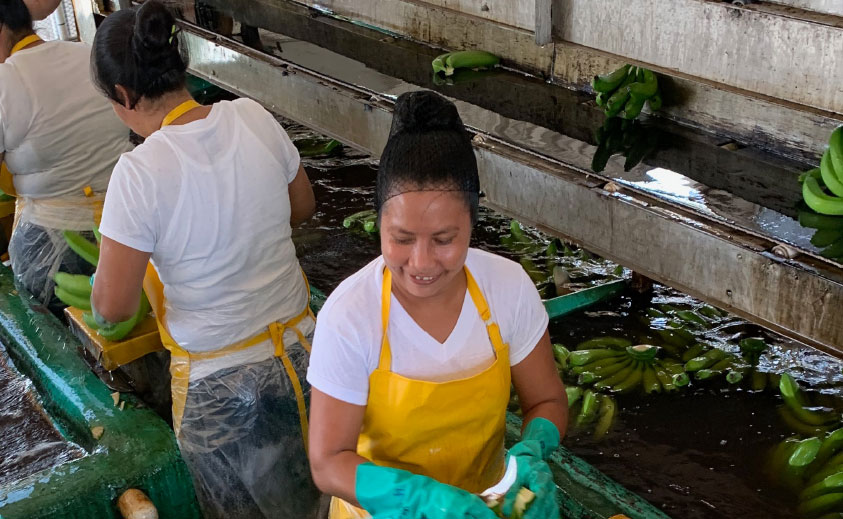
Jan 28, 2021
Unionized workers on Guatemala banana plantations earn more, work fewer hours, face less sexual harassment, and have safer workplaces, including during the Covid-19 pandemic, according to a Solidarity Center report. (The report also is available in Spanish.)
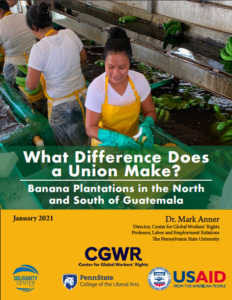 “What Difference Does a Union Make? Banana Plantations in the North and South of Guatemala” finds that non-unionized workers in the country’s south earn less than half the hourly pay of unionized workers in the north, while working 12 hours per week more. Thirty-nine percent of all bananas sold in the United States are produced in Guatemala.
“What Difference Does a Union Make? Banana Plantations in the North and South of Guatemala” finds that non-unionized workers in the country’s south earn less than half the hourly pay of unionized workers in the north, while working 12 hours per week more. Thirty-nine percent of all bananas sold in the United States are produced in Guatemala.
Working conditions are very similar to modern slavery at the two-thirds of Guatemalan banana plantations not unionized, said César Humberto Guerra López, national secretary of labor and conflicts for SITRABI (Union of Banana Workers of Izabal). “The Labor Ministry and the courts are guardians of business interests, they are not on the side of the workers.” Guerra spoke at a Solidarity Center panel event yesterday to discuss the report’s findings. (Watch the full event here.)
While plantation workers in the North on average are paid $2.52 an hour, those along the Pacific Coast in the south are paid $1.05 an hour, said Mark Anner, director of the Center for Global Workers’ Rights and professor of labor and employment relations at Pennsylvania State University. Anner is author of the report, which surveyed 210 workers between September 2019 and March 2020.
“Workers without trade unions around the world, and Guatemala in particular, have lower paying jobs, more dangerous jobs, jobs with abuse and fewer rights,” said Solidarity Center Executive Director Shawna Bader-Blau in the panel’s opening remarks. “So what difference does a union make? It makes all the difference to workers in Guatemala.”
Far More Sexual Harassment at Nonunion Banana Plantations
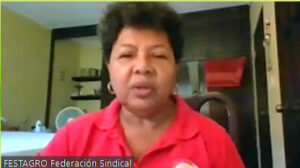
Irís Munguía discussed the challenges women on banana plantations face when they don’t have a union to advocate for their rights. Credit: Solidarity Center
In one of the report’s most notable findings, 59 percent of women surveyed in non-union banana packing plants say they face sexual harassment and other forms of gender-based violence at work compared with 9 percent of women at unionized packing plants. Non-union workers are 81 percent more likely to face verbal abuse than union workers.
“If a woman reports someone who is harassing her, that woman could be fired. Because he’s the boss and we are the workers,” Irís Munguía said, speaking through a translator. Munguía, women’s coordinator of the Honduran Federation of Agro-industrial Unions-FESTAGRO, was the first woman coordinator of COLSIBA, the Latin American coordinating body of agricultural unions.
The report cites Carmen, a SITRABI union leader, who says sexual harassment and other forms of gender-based violence are much lower in unionized facilities because unions hold employers accountable. “If a man touches me, I can inform the company. Managers have been fired [for sexual harassment]. There is more respect now. And if someone doesn’t respect us, the issue goes to the union-management committee.”
Banana Workers Killed for Seeking to Form Unions
Workers have not formed unions in the south because “there is fear, panic to organize in a union,” according to Guerra. He said that when workers in the southern region last attempted to form a union in 2007, one union leader was killed and the daughter of another union leader raped, while other union activists received threats. “The consequences of fear continue to be very palpable for the workers,” he said.
Anner said his research found that between 2004 and 2018, 101 union activists were killed in Guatemala for trying to form unions and achieve decent work. The majority of those murders took place in the Southern part of Guatemala, in the regions where non-union banana plantations have expanded in the last two decades.
With no unions to champion worker rights, banana plantations and packing plants in the south do not comply with laws limiting working hours, regulating wages or ensuring safety, Guerra said. Workers labor 12 hours a day, Monday through Saturday.
Agricultural and production facilities have moved work to the south to pay the lowest wages. As the report makes clear, the root causes for the push for low wages goes to the top of the supply chain. “Fruit companies no longer wield power in the production process, that power is slowly being displaced by mega supermarkets that constantly look for ways to squeeze prices,” the report says.
“Wal-Mart requires such low prices that multinational corporations are pushing the directly owned facilities in the north to outsource to the south,” Anner said. And that means seeking out plantations in a nonunion region where wages are brutally low.
The report also finds that all production facilities that engage in worker rights violations have been inspected by private certification programs, including by Global G.A.P. and Rain Forest Alliance. “Management tells workers what to say to the certification inspectors before the inspectors arrive,” the report finds.
The Union Difference
Guerra and Munguía, long-time union leaders who began working on banana plantations in their teens, shared their successes in helping workers achieve their rights through unions.
In the north, SITRABI has 17 negotiated collective agreements, and wages at one plantation, a Del Monte subsidiary, are three to four times higher than at non-union facilities, Guerra said.
Munguía described a landmark regional agreement COLSIBA negotiated with Chiquita that ensures zero tolerance for sexual harassment and gender-based violence at work. The agreement covers banana workers in Costa Rica, Guatemala, Honduras and Panama. The agreement shows “the importance and the great difference in belonging to the union and not being unionized.”
“Dignity on the job and just livelihoods—this is something we can reach only through union organizations,” Munguía said.
Joell Molina, Solidarity Center trade union strengthening director, moderated the panel. The report was commissioned by the Solidarity Center under the USAID-funded Global Labor Program and written by Center for Global Workers’ Rights/School of Labor and Employment Relations at Penn State University, is co-published by the Center for Global Workers’ Rights.
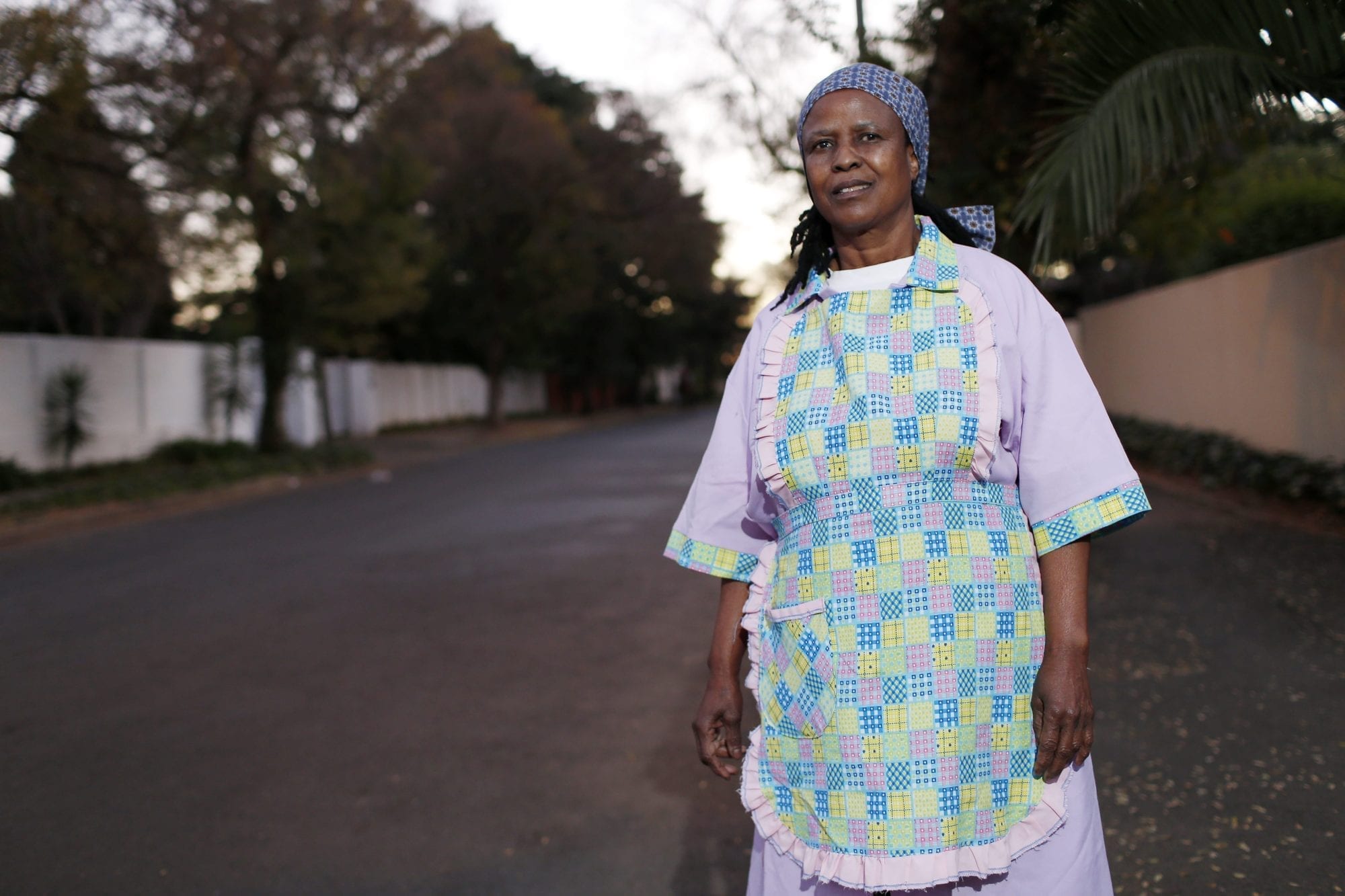
Jan 11, 2021
In an historic judgment, the South African Constitutional Court in mid-November recognized that injury and illness arising from work as a domestic worker in a private home is no different to that occurring in other workplaces and equally deserving of compensation. Beyond recognizing occupational hazards in the home, the decision also recognized the broader harm wrought by the invisibility of gendered, racialized work in the privacy of homes in the context of post-colonial and post-apartheid South Africa.
In the case of Mahlangu and Another v Minister of Labor and Others, the South African Domestic Service and Allied Workers Union (SADSAWU), with support from the Solidarity Center, challenged the constitutionality of provisions of the Compensation for Occupational Injury and Illness Act (COIDA), which precludes domestic workers employed in private homes from making claims to the Compensation Fund in cases of illness, injury, disablement or death at work. The Constitutional Court agreed that this exclusion violates rights to social security, equality and dignity, and it made this finding retroactively applicable from 1994, the date the South African constitution was enacted. In so doing, the court articulated a theory of intersectional discrimination and moved forward its own jurisprudence on indirect discrimination, infusing the right to social security, dignity and retrospective application with an intersectional analysis. It also reframed the narrative on domestic workers: no longer invisible but “unsung heroines in this country and globally”(paragraph 1).
The judgment gives a central role to international law, and establishes that “in assessing discrimination against a group or class of women of this magnitude that a broad national and international approach be adopted in the discourse affecting domestic workers“(Paragraph 42). It continues that, under international law conventions, including the International Covenant on Economic, Social and Cultural Rights (ICESCR), the exclusion of domestic workers from COIDA is inexplicable.
The court found that COIDA is a form of social security because the inability to work or the loss of a breadwinner’s support as a result of the COIDA exclusion, traps domestic workers and their dependents in cycles of poverty. According to the court this exclusion is unreasonable because it did not take into account the needs of the most vulnerable members of society, particularly those who experience compounded vulnerabilities arising from intersecting maltreatment based on race, sex, gender and/or class. It concludes that there is no legitimate objective to the exclusion, rather it entrenches patterns of disadvantage.
This case could be easily disposed on grounds of direct discrimination, since the majority found the exclusion irrational and arbitrary, and therefore constitutionally invalid. However, the case provided the court with a unique opportunity to interpret constitutional provisions on indirect discrimination, using an intersectional framework: Domestic workers “are predominantly Black women … and discrimination against them constitutes indirect discrimination on the basis of race, sex and gender” (paragraph 75). It goes on to find that discrimination on the grounds of race, gender and sex are not only presumptively unfair “but the level of discrimination is aggravated”(paragraph 73).
The court took the opportunity to enunciate a theory of intersectionality, which considers the social structures that shape the experience of marginalization, and the convergence of sexism, racism and class stratification. Viewed historically, the racial hierarchy established by apartheid, placed Black women at the bottom of the social hierarchy and relegated them to low-skilled and low-paid sectors of the workforce, such as domestic work. This sector was and is predominated by Black women and remains the third largest employer of women in South Africa. Yet it continues to be characterized by poverty-level salaries and poor living conditions, in which domestic workers are deprived of their own family while caring for that of their employers. As a result, the court found that domestic workers are a “critically vulnerable group of workers,” declaring the COIDA exclusion invalid both at an individual and group level (paragraph 106).
Background
The case centers on Maria Mahlangu, who was employed as a domestic worker in a private house for 22 years. According to her family, she was partially blind and could not swim. In March 2012 while at work, she fell into her employer’s swimming pool and drowned. When Mahlangu’s dependent daughter approached the Department of Labor for compensation, she was told that she was precluded from doing so under COIDA. Then SADSAWU organizer Pinky Mashiane read about the incident in a newspaper and approached the family to see how she could assist.
In 2013, the Solidarity Center embarked on a research project under a USAID grant to examine domestic workers’ socioeconomic rights in South Africa, which culminated in a list of domestic worker issues requiring urgent law reform. At the top of this list was inclusion of domestic workers in COIDA. Indeed, the issue had been on the agenda since 2001, without legislative reform being passed.
At the same time the Solidarity Center was looking for a litigant to challenge COIDA’s constitutionality. Pinky Mashiane—after having been turned down by multiple lawyers and law centers—was looking for a remedy to assist Mahlangu’s family. The Solidarity Center approached lawyers in South Africa as well as SADSAWU leadership with the proposal to litigate this case in constitutional terms, with financial support. Beginning in 2015, the case wound its way through the South African court system, litigated before the Constitutional Court by lawyers from the Social and Economic Rights Institute (SERI).
The case benefited from sustained advocacy at global and local levels. In 2019 , the Solidarity Center and partners brought the issue of domestic workers’ exclusion from COIDA before the United Nations Committee on Economic, Social and Cultural Rights, which was considering South Africa’s compliance with treaty obligations. In its concluding observations, cited in the Constitutional Court’s decision, the Committee recommended that South Africa include domestic workers in COIDA. Similarly, in the early stages of litigation, the amicus, the Gender Commission of South Africa, expressed frustration at the almost complete absence of information on the types of injuries and illnesses arising in the context of domestic work in private homes. To fill this vacuum, Solidarity Center commissioned qualitative research consisting of in-depth interviews with domestic workers around the country, describing the types of injury and illness occurring in the context of the home. After the COVID-19 pandemic broke out, which had severe consequences for domestic workers, domestic worker unions and partners also put together a petition to try and propel the legislature to include domestic workers in COIDA. Most significantly, at each of the numerous court hearings, the domestic worker unions and groups maintained a constant presence at the court, and in the media, insisting that the death of Maria Mahlangu not be in vain.
Far-Reaching Impact
When Solidarity Center initially proposed constitutional impact litigation on COIDA, it was with the hope that a successful outcome in this case would serve three purposes: obtain much-needed relief for domestic workers who were outside of COIDA’s purview; strengthen domestic worker unions; and create an important precedent that would lay the foundation for jurisprudence on domestic workers that could serve as a global marker.
The Mahlangu decision will clearly achieve the first as it removes the legal obstacle to domestic workers claiming compensation, with immediate and retrospective effect. Meanwhile, the long road to Mahlangu has also strengthened a growing coalition of unions and NGOs that have articulated their claims effectively in all forms of media. The fact that after 26 years of democracy, Mahlangu is the first case brought by the domestic worker union to the apex court of South Africa and guardian of constitutional values is a significant milestone.
Yet, perhaps the greatest import of Mahlangu might lie both in its precedent and in the paradigm it establishes to conceptualize domestic work. Using international human rights norms as a reference point, the court sets up an approach on domestic workers as a category, which stands to benefit domestic workers in South Africa and beyond. It also reasserts the goals of transformative constitutionalism as “undoing gendered and racialized poverty” and insists that an intersectional and historic lens is essential to the achievement of structural and systematic transformation. Indeed, the adoption of a historical lens allows the Court to reframe the narrative of domestic workers and their place in South Africa’s constitutional democracy: no longer powerless and invisible, but foundational toSouth Africa’s constitutional project. This reframing is captured eloquently in the concurring judgment of Justice Mhlantla who asserts that these Black women are smart, creative and survivors; who frequently work in environments that are emotionally and physically challenging, and which carry vestiges of South Africa’s colonial and apartheid past. She concludes: “On the contrary, they have a voice,” and according to Justice Mhlanthla J (paragraph 195) as well as the substance of majority judgment, the Constitutional Court is “listening.”





 “
“
